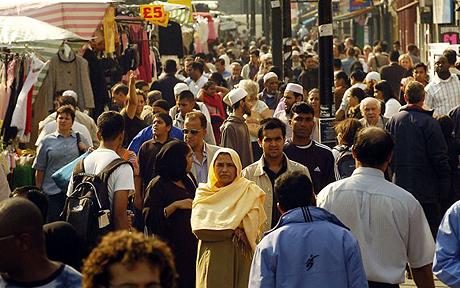
Diversity Crammed in East London
In 2007, Robert Putnam, a political scientist and professor at Harvard University, published a study entitled E Pluribus Unum: Diversity and Community in the 21st Century, examining the effects that diversity, particularly racial and ethnic diversity, has on communities. Much to Putnam’s chagrin, the study smashes the “diversity is our greatest strength” nonsense by clearly showing that diversity has a massively negative effect on communities, families, and individuals. “In the presence of diversity, we hunker down [and] act like turtles,” Putnam says. “The effect of diversity is worse than had been imagined. And it’s not just that we don’t trust people who are not like us. In diverse communities, we don’t trust people who do look like us.”1 Instead, people tend to “withdraw even from close friends, to expect the worst from their community and its leaders, to volunteer less, give less to charity and work on community projects less often, to register to vote less, to agitate for social reform more but have less faith they can actually make a difference, and to huddle unhappily in front of the television.”2 This is certainly not the ideal multiracial, multicultural utopia we were promised by the racial egalitarians and open-border enthusiasts.
A year earlier in 2006, the Commission for Racial Equality in the UK came to the same conclusion and went even further, saying that diversity had negative effects not only on trust but on happiness as well. “We’ve done work here which shows that people, frankly, when there aren’t other pressures, like to live within a comfort zone which is defined by racial sameness,” said Trevor Phillips chairman of the CRE. “People feel happier if they’re with people who are like themselves.”3 We can only imagine how damning the evidence must have been if the Marxist Commission for Racial Equality, whose very purpose is to cram diversity down the native British population’s collective throat, was willing to admit to even this much. Phillips’s solution to this problem is some nebulous, feel-good jibberish about “respect,” “building bridges,” and “shared values” (as if wildly different ethnicities have the same values). We can see how completely this has failed to work over the past five years with the recent black riots in London.
None of this should be in the least surprising to a Christian. God has designed us to live in ethnically based communities and countries. When man decides he knows better than God and rebels against God’s order, we should naturally expect the results to be disastrous. It should also be obvious that those who advocate for multiculturalism and massive immigration are the actual haters, while those who advocate for monoculturalism and ethnic homogeneity are the ones who truly care about peoples’ well being. With hard truths, ethnonationalists seek to build happy, open communities, while with pretty lies, multiracialists seek to destroy communities with distrust and unhappiness. It is sad that the modern church has decided to side with the latter category to everyone’s detriment – even to the minorities they claim to care about.
Footnotes
| Tweet |
|
|
|




